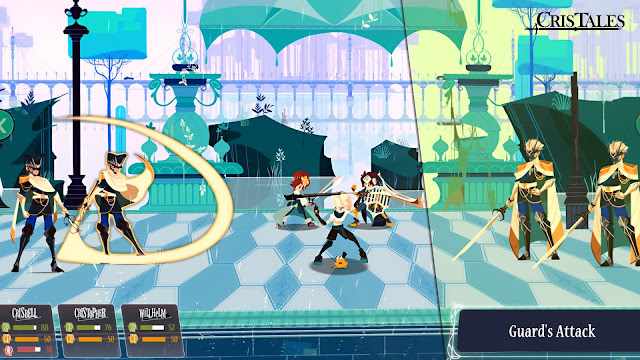It’s rare that we get a JRPG that can be considered to be genuinely innovative. Cris Tales might have been inspired by the genre’s classics, but it’s a far more modern and bold game than I think even the developers realised they were making. It all works, too. Beautifully. If it wasn’t for a couple of missteps here and there it would be one of the year’s greatest but, unfortunately, this game has big issues to go with its breathtaking vision.
I’ll get the negative out of the way first. Most critically, Cris Tales is either too ambitious for the Nintendo Switch, or it’s simply too poorly optimised, because the loading times are unforgivable. There are loading screens everywhere. Every battle has a solid 10-second load into and out of the battle. Every new area has a loading screen. Every cut scene involves yet more waiting while gazing at a white screen. I remember being so disappointed the time I bought my favourite Final Fantasy (at the time) FFVI, legitimately, for the first time. I’d been playing the less-than-legitimate version via the magic of computers previously, but Square Enix released the game on the PlayStation, and I bought it instantly. I was crushed when I discovered that it was so poorly optimised that there was a couple of seconds loading every time I wanted to use the menu. Yes, it was only a couple of seconds, but that disrupted the flow of the game and, ultimately, made it frustrating to play. I haven’t been that crushed again since… until I played Cris Tales. It’s the loading times for the random encounters that are particularly galling and I stopped looking forward to the dungeons entirely because I didn’t want to deal with the frequent disruptions.
There are also some substantial balancing issues – for example, through much of the early part of the journey, the primary way to heal (tents) are far too expensive to buy, and far too infrequent in treasure chests. With few other opportunities to achieve a total party rest, it was a pain to scrape through dungeons on minimal health and resources at times. Boss battles also tend to be a brutal difficulty spike from the common enemies, even if you figure out the tricks that make them tick, and while that might have been fine for the SNES-era JRPGs that inspire the game, in 2021 difficulty should be much less arbitrary than that.
Together these issues really do drag on the experience, so it’s just as well that Cris Tales is such a vivid project that the creative energy got me through despite it. A big part of it is the aesthetics, of course. You can’t miss how beautiful this game is, with its whimsical pop-up book design, unique character art, and imaginative settings. The music perfectly complements this, too, giving the game a powerful sense of time and place and the end result is very similar to that of a fairy tale. That aesthetic backs up the game’s narrative, which is simple, but the right kind of simple. Cris Tales shares a lot of thought with an efficiency in words, and given how many modern games use a lot of words to say very little, this is a refreshing change. Cris Tales has a strong progressive bent to its narrative that falls across to key themes; the first is that it’s a statement that we should take climate change warnings seriously. In Cris Tales, the protagonist can see the current future track that the world is on, and often this future highlights a world destroyed by pollution, decay, rising sea waters and so on. Your goal is to motivate those around you to stop the extreme exploitation of the land and take steps to protect the people. That leads into the second key theme – Cris Tales is quite concerned with the class divide, and you’re generally encouraged to be sympathetic towards the labourers and downtrodden, who are often used for fodder (often quite literally), but the elite, residing within privileged ivory towers.
My read on Cris Tales is that it’s very sympathetic towards socialist thought (I spent a long time agonising over whether to mention the dreaded “S”-word in this review for fear of what it would do to the comments section, but the block button’s always there for that, I guess). South America has traditionally been a centre of progressive thought and environmentalism – Che Guevara was, of course, Argentinian, Costa Rica is famous for being one of the first nations to be effectively powered via renewable energy, and Bolivarianism (as in, the political philosophy of Simon Bolivar) gave the world Gran Columbia and subsequently the political identity of many of the modern nations across the north of South America. Columbia itself is considered one of the more right-wing South American nations, and even then in the 2018 election the losing leader was a former Marxist guerilla fighter, and he still secured 42 per cent of the vote. Given the culture of the region, then it’s not really any surprised that Cris Tales turned out to be more explicitly progressive than we generally see from the genre (which is often progressive, to be sure, but not so overtly forward about it), especially when the developers made it quite clear that their goal was to bring Columbian storytelling into the game.
I don’t know that much about Columbian storytelling and narrative traditions myself. It is, to my great shame, a blind spot. But perhaps this is a place to start, since a lot of the stuff that I found most appealing about the game’s storytelling apparently did come from Columbian storytelling. As the developer said in their interview with me: “You will find a cathedral made out of salt, which is based on a real cathedral made out of salt from Colombia, or how Matías, the little frog companion of Crisbell is based on the Colombian golden frog, a very poisonous frog in real life! Crisbell’s own hometown, Narim, is based on the real place Nariño, and specifically, Ipiales, where you will find a very similar cathedral to the one in the game,” and none of that I would have known were it not for this game. Now I want to learn more, and that has always been the strength of “foreign art.” Just as Samurai Warriors inspired me to learn about Japanese history, my main takeaway from Cris Tales is that I want to learn more about the Columbian sense of “fairy tales” and where these stories of whimsy come from.
Beyond the narrative and adventure, which was largely enough to draw me in and allow me to forgive the game its technical foibles, Cris Tales’ other great strength is the combat system, which really is one of the most interesting and envigorating that I’ve come across in a turn-based JRPG in quite some time. The main hook is that you can send enemies forward and backwards in time, and you’ll need to frequently do this to capitalise on their weaknesses. For example, you might poison an enemy in the “now,” only to then send them into the future, where they’ll take a lot of poison damage all at once. You might weaken another enemy by sending them back in time, or enfeeble an enemy by making them old and whithered. Achieving these combos requires that characters work together, and piecing together effective strategies is a massively entertaining process from start to finish. What’s more, it’s something you’ll want to use in battles frequently to even otherwise difficult odds. Most JRPGs end up in a place where players only engage with their most interesting tricks in the boss battles, but in this one you’ll need to be tactical about most encounters – so it’s just as well that the mechanics are great, and range of enemies and designs makes each of those combat encounters enjoyable.
Dungeons are striking more for their aesthetic than their design, but they do the task nicely, giving you plenty of treasure chests and bonuses to track down. I always like when a JRPG hides treasure chests in plain sight and then encourages you to figure out how to reach them, and this game does that nicely, without require too much puzzling on the side of the player. Otherwise Cris Tales has all the usual features that you’d expect from a modern JRPG – irritating sidequests, difficulty spikes and the occasional need to grind up some experience – however, this is all streamlined enough that the busywork doesn’t become too much of a drudge.
I really hope the other platforms that Cris Tales has been released on have better performance, because those loading times alone take something special, and unfortunately undermine it. This is one of those rare times to me where technical issue really do mess with the experience, disrupting the carefully-structured panic and pulling players away from the breathtaking art. There’s still a lot to love about Cris Tales, and the vision is beautiful and evocative. But we are in 2021 and battles in an JRPG shouldn’t require a loading screen. No matter how beautiful and heartfelt they are.










